Exploring Contemporary Issues in International Tourism Industry
VerifiedAdded on 2023/05/30
|6
|1458
|396
Essay
AI Summary
This essay examines contemporary issues in international tourism, focusing on climate change, transportation, and global warming. It highlights how climate change affects tourist destinations and travel demand, emphasizing the need for detailed climate information for tourism planning. The essay also explores the relationship between transportation costs and tourism, noting the impact of fluctuating fuel prices and currency fluctuations on travel affordability. Furthermore, it addresses the effects of global warming on coastal regions, including potential opportunities and the contribution of the tourism sector to greenhouse gas emissions, particularly from the aviation industry. The conclusion underscores the potential for positive development in the international tourism industry if these issues are addressed effectively, boosting both international and national economies.
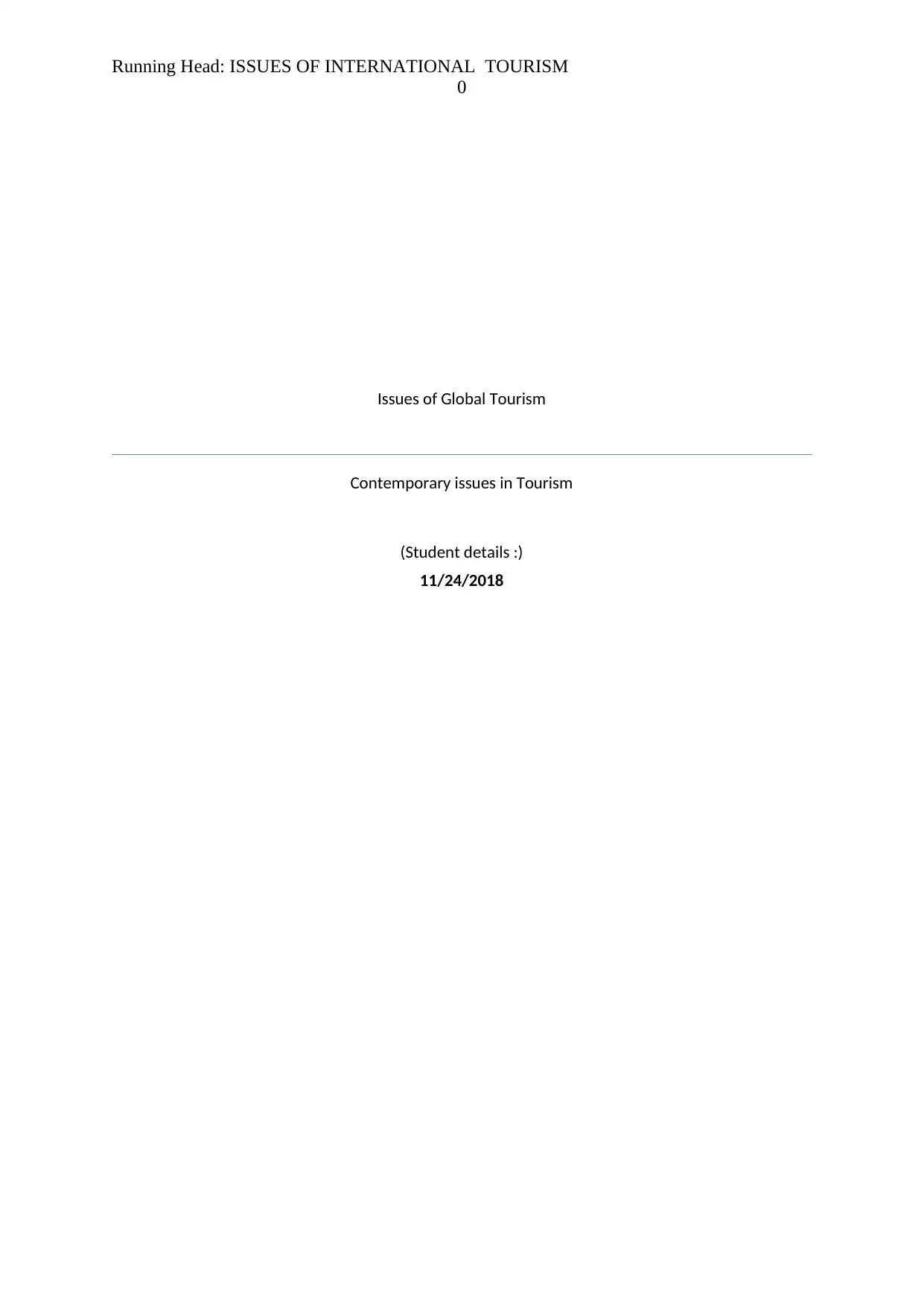
Running Head: ISSUES OF INTERNATIONAL TOURISM
0
Issues of Global Tourism
Contemporary issues in Tourism
(Student details :)
11/24/2018
0
Issues of Global Tourism
Contemporary issues in Tourism
(Student details :)
11/24/2018
Paraphrase This Document
Need a fresh take? Get an instant paraphrase of this document with our AI Paraphraser
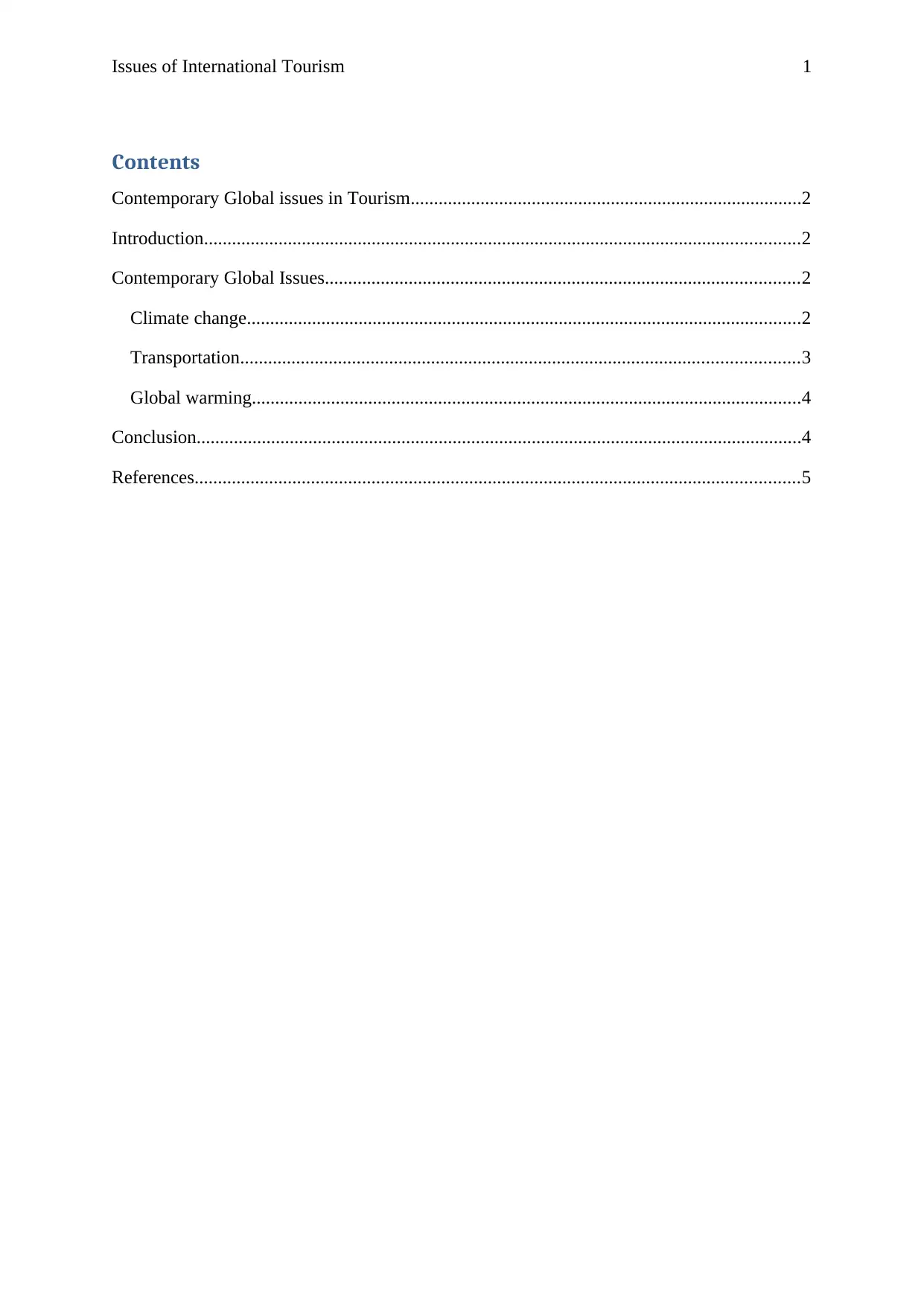
Issues of International Tourism 1
Contents
Contemporary Global issues in Tourism....................................................................................2
Introduction................................................................................................................................2
Contemporary Global Issues......................................................................................................2
Climate change.......................................................................................................................2
Transportation........................................................................................................................3
Global warming......................................................................................................................4
Conclusion..................................................................................................................................4
References..................................................................................................................................5
Contents
Contemporary Global issues in Tourism....................................................................................2
Introduction................................................................................................................................2
Contemporary Global Issues......................................................................................................2
Climate change.......................................................................................................................2
Transportation........................................................................................................................3
Global warming......................................................................................................................4
Conclusion..................................................................................................................................4
References..................................................................................................................................5
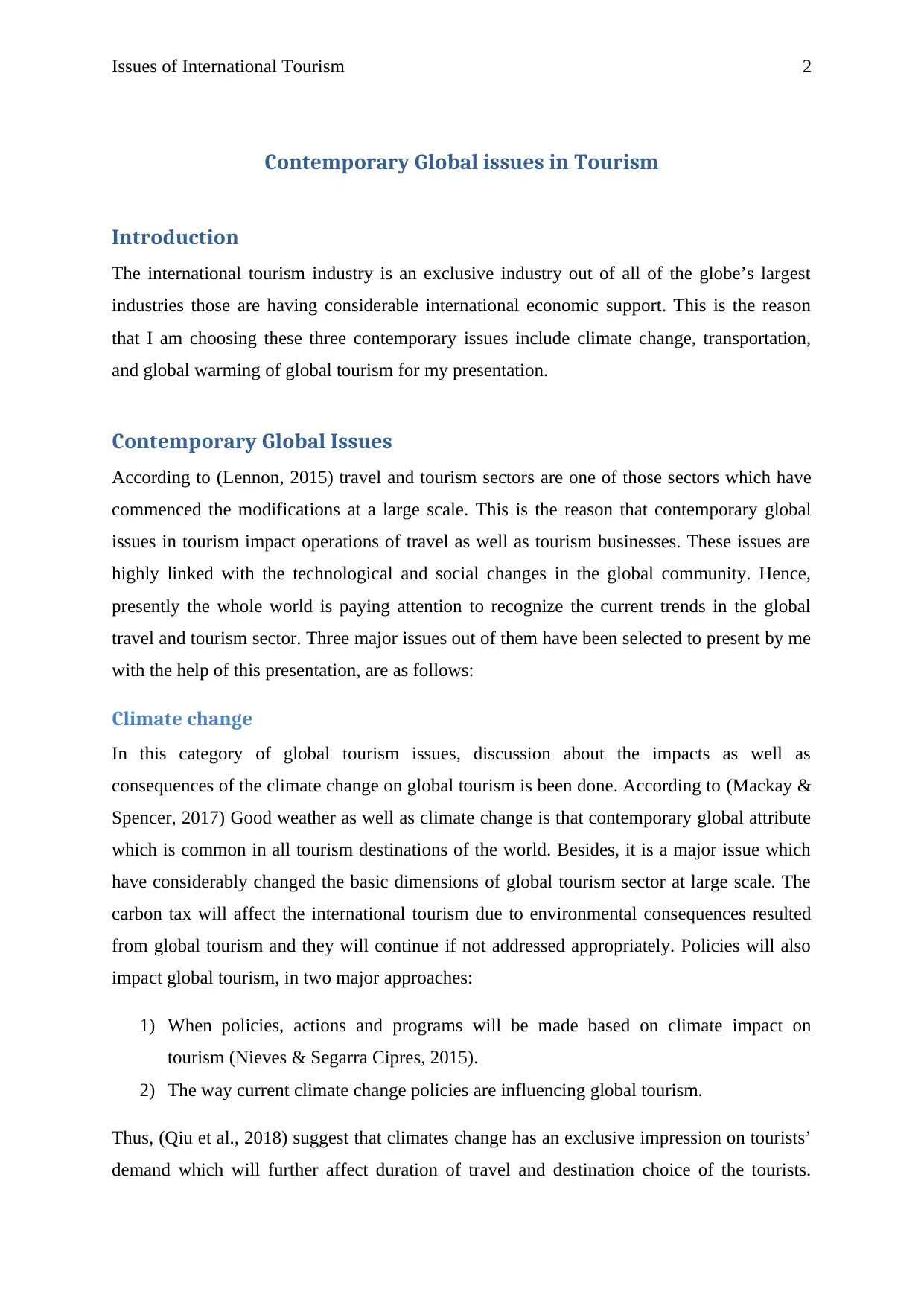
Issues of International Tourism 2
Contemporary Global issues in Tourism
Introduction
The international tourism industry is an exclusive industry out of all of the globe’s largest
industries those are having considerable international economic support. This is the reason
that I am choosing these three contemporary issues include climate change, transportation,
and global warming of global tourism for my presentation.
Contemporary Global Issues
According to (Lennon, 2015) travel and tourism sectors are one of those sectors which have
commenced the modifications at a large scale. This is the reason that contemporary global
issues in tourism impact operations of travel as well as tourism businesses. These issues are
highly linked with the technological and social changes in the global community. Hence,
presently the whole world is paying attention to recognize the current trends in the global
travel and tourism sector. Three major issues out of them have been selected to present by me
with the help of this presentation, are as follows:
Climate change
In this category of global tourism issues, discussion about the impacts as well as
consequences of the climate change on global tourism is been done. According to (Mackay &
Spencer, 2017) Good weather as well as climate change is that contemporary global attribute
which is common in all tourism destinations of the world. Besides, it is a major issue which
have considerably changed the basic dimensions of global tourism sector at large scale. The
carbon tax will affect the international tourism due to environmental consequences resulted
from global tourism and they will continue if not addressed appropriately. Policies will also
impact global tourism, in two major approaches:
1) When policies, actions and programs will be made based on climate impact on
tourism (Nieves & Segarra Cipres, 2015).
2) The way current climate change policies are influencing global tourism.
Thus, (Qiu et al., 2018) suggest that climates change has an exclusive impression on tourists’
demand which will further affect duration of travel and destination choice of the tourists.
Contemporary Global issues in Tourism
Introduction
The international tourism industry is an exclusive industry out of all of the globe’s largest
industries those are having considerable international economic support. This is the reason
that I am choosing these three contemporary issues include climate change, transportation,
and global warming of global tourism for my presentation.
Contemporary Global Issues
According to (Lennon, 2015) travel and tourism sectors are one of those sectors which have
commenced the modifications at a large scale. This is the reason that contemporary global
issues in tourism impact operations of travel as well as tourism businesses. These issues are
highly linked with the technological and social changes in the global community. Hence,
presently the whole world is paying attention to recognize the current trends in the global
travel and tourism sector. Three major issues out of them have been selected to present by me
with the help of this presentation, are as follows:
Climate change
In this category of global tourism issues, discussion about the impacts as well as
consequences of the climate change on global tourism is been done. According to (Mackay &
Spencer, 2017) Good weather as well as climate change is that contemporary global attribute
which is common in all tourism destinations of the world. Besides, it is a major issue which
have considerably changed the basic dimensions of global tourism sector at large scale. The
carbon tax will affect the international tourism due to environmental consequences resulted
from global tourism and they will continue if not addressed appropriately. Policies will also
impact global tourism, in two major approaches:
1) When policies, actions and programs will be made based on climate impact on
tourism (Nieves & Segarra Cipres, 2015).
2) The way current climate change policies are influencing global tourism.
Thus, (Qiu et al., 2018) suggest that climates change has an exclusive impression on tourists’
demand which will further affect duration of travel and destination choice of the tourists.
⊘ This is a preview!⊘
Do you want full access?
Subscribe today to unlock all pages.

Trusted by 1+ million students worldwide
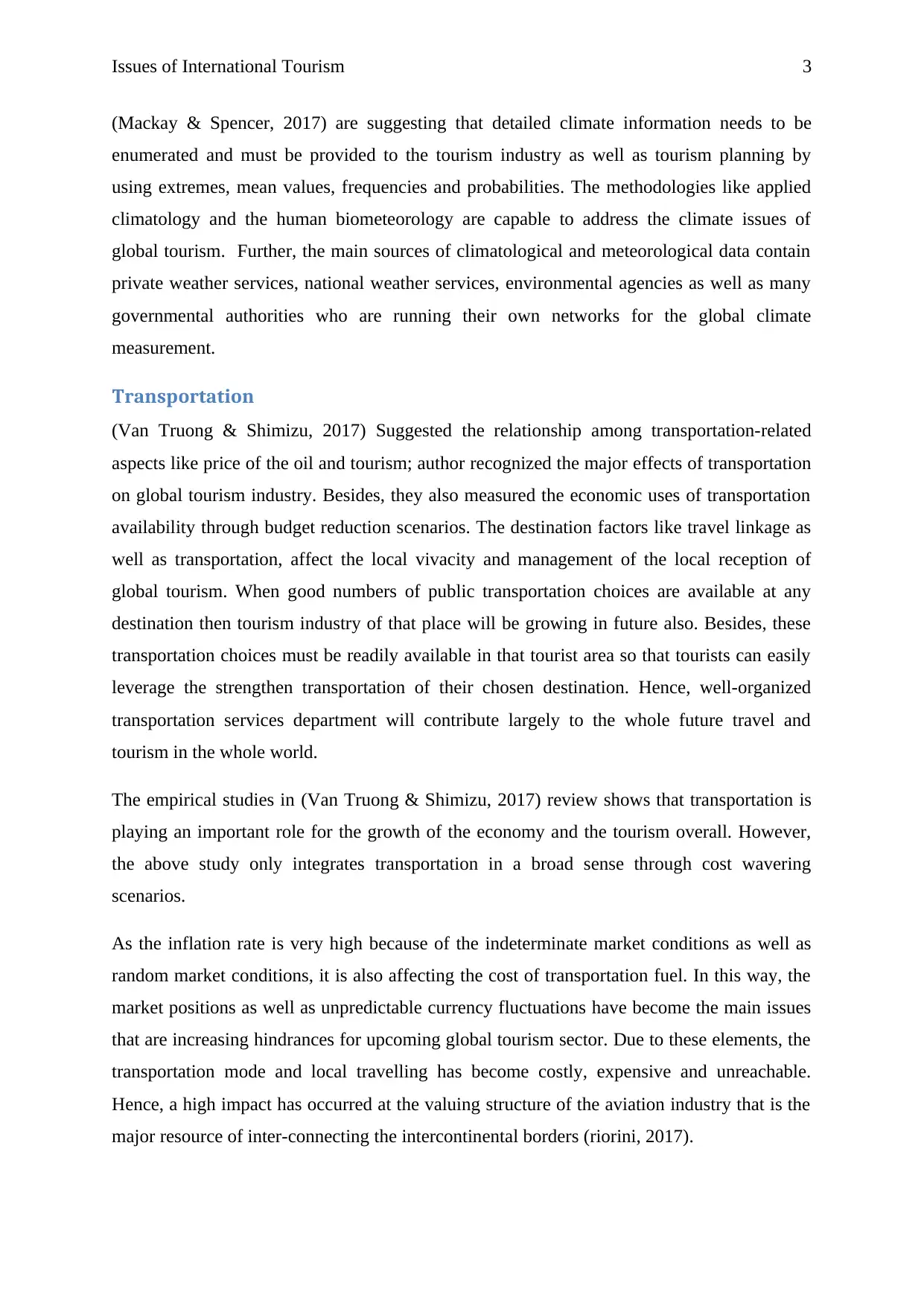
Issues of International Tourism 3
(Mackay & Spencer, 2017) are suggesting that detailed climate information needs to be
enumerated and must be provided to the tourism industry as well as tourism planning by
using extremes, mean values, frequencies and probabilities. The methodologies like applied
climatology and the human biometeorology are capable to address the climate issues of
global tourism. Further, the main sources of climatological and meteorological data contain
private weather services, national weather services, environmental agencies as well as many
governmental authorities who are running their own networks for the global climate
measurement.
Transportation
(Van Truong & Shimizu, 2017) Suggested the relationship among transportation-related
aspects like price of the oil and tourism; author recognized the major effects of transportation
on global tourism industry. Besides, they also measured the economic uses of transportation
availability through budget reduction scenarios. The destination factors like travel linkage as
well as transportation, affect the local vivacity and management of the local reception of
global tourism. When good numbers of public transportation choices are available at any
destination then tourism industry of that place will be growing in future also. Besides, these
transportation choices must be readily available in that tourist area so that tourists can easily
leverage the strengthen transportation of their chosen destination. Hence, well-organized
transportation services department will contribute largely to the whole future travel and
tourism in the whole world.
The empirical studies in (Van Truong & Shimizu, 2017) review shows that transportation is
playing an important role for the growth of the economy and the tourism overall. However,
the above study only integrates transportation in a broad sense through cost wavering
scenarios.
As the inflation rate is very high because of the indeterminate market conditions as well as
random market conditions, it is also affecting the cost of transportation fuel. In this way, the
market positions as well as unpredictable currency fluctuations have become the main issues
that are increasing hindrances for upcoming global tourism sector. Due to these elements, the
transportation mode and local travelling has become costly, expensive and unreachable.
Hence, a high impact has occurred at the valuing structure of the aviation industry that is the
major resource of inter-connecting the intercontinental borders (riorini, 2017).
(Mackay & Spencer, 2017) are suggesting that detailed climate information needs to be
enumerated and must be provided to the tourism industry as well as tourism planning by
using extremes, mean values, frequencies and probabilities. The methodologies like applied
climatology and the human biometeorology are capable to address the climate issues of
global tourism. Further, the main sources of climatological and meteorological data contain
private weather services, national weather services, environmental agencies as well as many
governmental authorities who are running their own networks for the global climate
measurement.
Transportation
(Van Truong & Shimizu, 2017) Suggested the relationship among transportation-related
aspects like price of the oil and tourism; author recognized the major effects of transportation
on global tourism industry. Besides, they also measured the economic uses of transportation
availability through budget reduction scenarios. The destination factors like travel linkage as
well as transportation, affect the local vivacity and management of the local reception of
global tourism. When good numbers of public transportation choices are available at any
destination then tourism industry of that place will be growing in future also. Besides, these
transportation choices must be readily available in that tourist area so that tourists can easily
leverage the strengthen transportation of their chosen destination. Hence, well-organized
transportation services department will contribute largely to the whole future travel and
tourism in the whole world.
The empirical studies in (Van Truong & Shimizu, 2017) review shows that transportation is
playing an important role for the growth of the economy and the tourism overall. However,
the above study only integrates transportation in a broad sense through cost wavering
scenarios.
As the inflation rate is very high because of the indeterminate market conditions as well as
random market conditions, it is also affecting the cost of transportation fuel. In this way, the
market positions as well as unpredictable currency fluctuations have become the main issues
that are increasing hindrances for upcoming global tourism sector. Due to these elements, the
transportation mode and local travelling has become costly, expensive and unreachable.
Hence, a high impact has occurred at the valuing structure of the aviation industry that is the
major resource of inter-connecting the intercontinental borders (riorini, 2017).
Paraphrase This Document
Need a fresh take? Get an instant paraphrase of this document with our AI Paraphraser
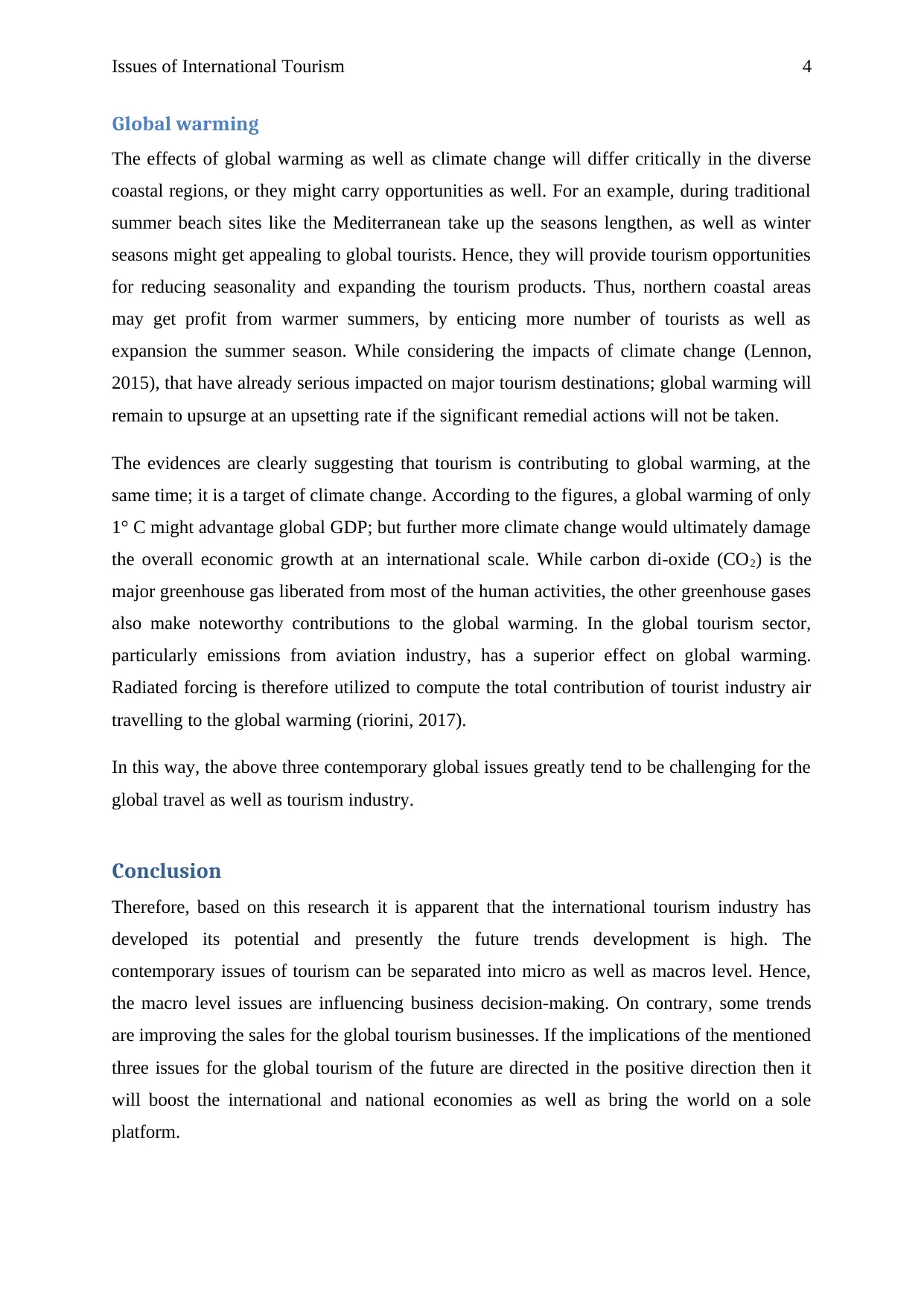
Issues of International Tourism 4
Global warming
The effects of global warming as well as climate change will differ critically in the diverse
coastal regions, or they might carry opportunities as well. For an example, during traditional
summer beach sites like the Mediterranean take up the seasons lengthen, as well as winter
seasons might get appealing to global tourists. Hence, they will provide tourism opportunities
for reducing seasonality and expanding the tourism products. Thus, northern coastal areas
may get profit from warmer summers, by enticing more number of tourists as well as
expansion the summer season. While considering the impacts of climate change (Lennon,
2015), that have already serious impacted on major tourism destinations; global warming will
remain to upsurge at an upsetting rate if the significant remedial actions will not be taken.
The evidences are clearly suggesting that tourism is contributing to global warming, at the
same time; it is a target of climate change. According to the figures, a global warming of only
1° C might advantage global GDP; but further more climate change would ultimately damage
the overall economic growth at an international scale. While carbon di-oxide (CO2) is the
major greenhouse gas liberated from most of the human activities, the other greenhouse gases
also make noteworthy contributions to the global warming. In the global tourism sector,
particularly emissions from aviation industry, has a superior effect on global warming.
Radiated forcing is therefore utilized to compute the total contribution of tourist industry air
travelling to the global warming (riorini, 2017).
In this way, the above three contemporary global issues greatly tend to be challenging for the
global travel as well as tourism industry.
Conclusion
Therefore, based on this research it is apparent that the international tourism industry has
developed its potential and presently the future trends development is high. The
contemporary issues of tourism can be separated into micro as well as macros level. Hence,
the macro level issues are influencing business decision-making. On contrary, some trends
are improving the sales for the global tourism businesses. If the implications of the mentioned
three issues for the global tourism of the future are directed in the positive direction then it
will boost the international and national economies as well as bring the world on a sole
platform.
Global warming
The effects of global warming as well as climate change will differ critically in the diverse
coastal regions, or they might carry opportunities as well. For an example, during traditional
summer beach sites like the Mediterranean take up the seasons lengthen, as well as winter
seasons might get appealing to global tourists. Hence, they will provide tourism opportunities
for reducing seasonality and expanding the tourism products. Thus, northern coastal areas
may get profit from warmer summers, by enticing more number of tourists as well as
expansion the summer season. While considering the impacts of climate change (Lennon,
2015), that have already serious impacted on major tourism destinations; global warming will
remain to upsurge at an upsetting rate if the significant remedial actions will not be taken.
The evidences are clearly suggesting that tourism is contributing to global warming, at the
same time; it is a target of climate change. According to the figures, a global warming of only
1° C might advantage global GDP; but further more climate change would ultimately damage
the overall economic growth at an international scale. While carbon di-oxide (CO2) is the
major greenhouse gas liberated from most of the human activities, the other greenhouse gases
also make noteworthy contributions to the global warming. In the global tourism sector,
particularly emissions from aviation industry, has a superior effect on global warming.
Radiated forcing is therefore utilized to compute the total contribution of tourist industry air
travelling to the global warming (riorini, 2017).
In this way, the above three contemporary global issues greatly tend to be challenging for the
global travel as well as tourism industry.
Conclusion
Therefore, based on this research it is apparent that the international tourism industry has
developed its potential and presently the future trends development is high. The
contemporary issues of tourism can be separated into micro as well as macros level. Hence,
the macro level issues are influencing business decision-making. On contrary, some trends
are improving the sales for the global tourism businesses. If the implications of the mentioned
three issues for the global tourism of the future are directed in the positive direction then it
will boost the international and national economies as well as bring the world on a sole
platform.
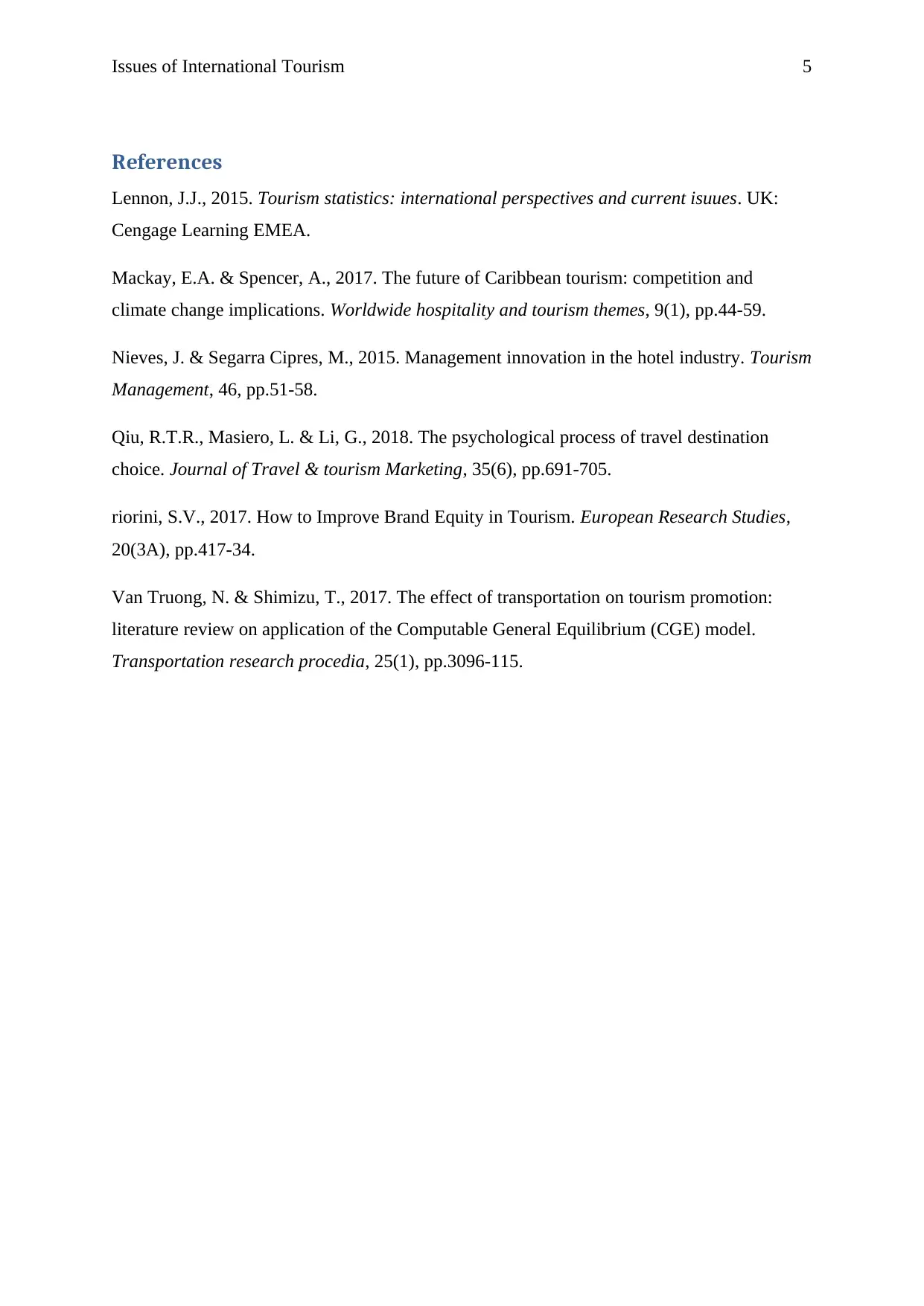
Issues of International Tourism 5
References
Lennon, J.J., 2015. Tourism statistics: international perspectives and current isuues. UK:
Cengage Learning EMEA.
Mackay, E.A. & Spencer, A., 2017. The future of Caribbean tourism: competition and
climate change implications. Worldwide hospitality and tourism themes, 9(1), pp.44-59.
Nieves, J. & Segarra Cipres, M., 2015. Management innovation in the hotel industry. Tourism
Management, 46, pp.51-58.
Qiu, R.T.R., Masiero, L. & Li, G., 2018. The psychological process of travel destination
choice. Journal of Travel & tourism Marketing, 35(6), pp.691-705.
riorini, S.V., 2017. How to Improve Brand Equity in Tourism. European Research Studies,
20(3A), pp.417-34.
Van Truong, N. & Shimizu, T., 2017. The effect of transportation on tourism promotion:
literature review on application of the Computable General Equilibrium (CGE) model.
Transportation research procedia, 25(1), pp.3096-115.
References
Lennon, J.J., 2015. Tourism statistics: international perspectives and current isuues. UK:
Cengage Learning EMEA.
Mackay, E.A. & Spencer, A., 2017. The future of Caribbean tourism: competition and
climate change implications. Worldwide hospitality and tourism themes, 9(1), pp.44-59.
Nieves, J. & Segarra Cipres, M., 2015. Management innovation in the hotel industry. Tourism
Management, 46, pp.51-58.
Qiu, R.T.R., Masiero, L. & Li, G., 2018. The psychological process of travel destination
choice. Journal of Travel & tourism Marketing, 35(6), pp.691-705.
riorini, S.V., 2017. How to Improve Brand Equity in Tourism. European Research Studies,
20(3A), pp.417-34.
Van Truong, N. & Shimizu, T., 2017. The effect of transportation on tourism promotion:
literature review on application of the Computable General Equilibrium (CGE) model.
Transportation research procedia, 25(1), pp.3096-115.
⊘ This is a preview!⊘
Do you want full access?
Subscribe today to unlock all pages.

Trusted by 1+ million students worldwide
1 out of 6
Related Documents
Your All-in-One AI-Powered Toolkit for Academic Success.
+13062052269
info@desklib.com
Available 24*7 on WhatsApp / Email
![[object Object]](/_next/static/media/star-bottom.7253800d.svg)
Unlock your academic potential
Copyright © 2020–2026 A2Z Services. All Rights Reserved. Developed and managed by ZUCOL.




